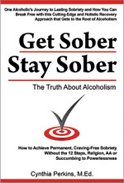Alcoholism in Marriage
The impact of alcoholism in a marriage is profound. This is one of the factors about alcohol addiction that makes it so unique in comparison to other chronic health conditions or disorders. All chronic health issues impact marriage and family relationships, but none in quite the same destructive manner or the same depth as alcoholism.
With most conditions, the individual inflicted doesn't engage in behaviors that hurt or destroy their relationship. The non-inflicted spouse usually gives them compassion, sympathy, understanding and support. They stand by their side through it all. They sometimes grow closer together as a result of the lessons learned through the process of illness and healing.
However, with alcoholism in the marriage, it is a slightly different story. Many non-alcoholic partners attempt to be loving, compassionate, understanding, etc., with their alcoholic partner initially, but then over time their patience is pushed to the limit as the alcoholic continues to do even more hurtful and damaging things to the marriage.
Intimacy
With alcoholism in the marriage, it becomes increasingly difficult to be supportive. Communication breaks down, intimacy is lost, resentments build, feelings are hurt, conflict escalates and goes unresolved, trust is broken and the quality of the relationship erodes over time.
In order to preserve their own sanity and sometimes safety, the non-alcoholic partner may be forced to put a great deal of emotional and/or physical distance between them and their alcoholic spouse. There's no way to soften the fact that alcoholism in a marriage, or any type of relationship, is abusive whether it contains physical violence or not, because the alcoholic is not capable of meeting the needs of their spouse adequately and engaging in a healthy relationship.
On the other hand, sometimes the non-alcoholic partner in the marriage becomes severely co-dependent and gives the alcoholic too much of the wrong kind of support and compassion. So much so, that they enable them in their addiction process. They get wrapped up in the alcoholics distorted thinking process and rationalize and justify behaviors that are unacceptable and damaging to the relationship.
Every Facet of the Relationship is Affected
The consequences of alcoholism in the marriage are many and can sometimes be devastating for all parties involved. Including the alcoholic themselves, the spouse, their children and extended family members. No one gets through it untouched. Every facet of the relationship is affected.
Alcoholics experience a great deal of moodiness and wide swings in emotions, which often causes the spouse to feel as if they have to "walk on egg shells" to avoid these emotional outbursts. In addition, partners also report that the alcoholic spouse is angrier, more jealous, possessive, suspicious, and irritable, which inevitably leads to more arguments and in some cases can escalate to verbal or physical abuse.
Financial
Another huge impact of alcoholism on marriage that many couples face is the financial aspect. The alcoholic spouse may be unable to hold a position or too much money is spent on alcohol. Bills may go unpaid, debts may occur. There isn't enough money for the basics. As such, the non-alcoholic spouse may become very resentful and be faced with having to carry the burden of providing more money themselves.
Stress
Alcoholism can cause major life-threatening, mental, and emotional problems which often lead to both parties feeling anxious, depressed, confused and frustrated. This can lead to stress and other negative feelings within the relationship. As a result, the non-alcoholic spouse may experience guilt, shame, and helplessness and may in fact start drinking themselves or engage in other types of self-defeating behavior as a way of coping with the stress.
The non-alcoholic spouse may suffer from low self esteem and a negative self image caused by verbal or physical abuse or simply due to the alcoholic partner's erratic behavior. As such, the non-alcoholic spouse may experience social withdrawal, depression and problems at work. They may also experience mental and stress related illnesses that lead to feeling anxious, depressed, confused and utterly frustrated.
Additionally, the non-alcoholic spouse will likely carry a great of stress in response to all the other effects of alcoholism on the relationship, worrying about their partner, finances, the impact on children, what the future holds, etc.
Communication
A rift in the marital communication pattern almost always occurs with alcoholism in marriage, as the non-alcoholic spouse may pull away from the alcoholic and vice-versa, or because they lose their skills and ability as a couple to communicate or too much resentment and unresolved conflict has accumulated.
Lack of communication in the relationship will lead to loss of emotional and sexual intimacy, abundant misunderstandings, lack of satisfaction and depth, more conflict and a less fulfilling relationship.
The more the alcoholism progresses, the less communication that will be taking place. The less communication taking place, the more the quality of the relationship will deteriorate.
Sexual Relations
Sexual relations are interrupted because of the alcoholic's inability to perform or lack of desire. Alternatively, the non-alcoholic spouse may lose desire for their partner as well, because the alcoholic is unattractive to them or incapable of satisfying them when intoxicated and reeking of alcohol.
Infidelity by the alcoholic may occur during drunken episodes, which the non-alcoholic spouse may or may not be aware of. If they are aware, then they must deal with the hurt and betrayal. If they're not aware, then they are exposed to the risks of sexually transmitted diseases without knowing it, and the unfaithful alcoholic is living with the guilt and shame of their actions. Whether they admit it or not, this undermines their relationship with their spouse. In addition, the non-alcoholic spouse may turn to another person for comfort and romance when they feel unloved and unappreciated by their spouse.
Children
Anytime there is alcoholism in marriage, the stress and strain between the couple is felt by the children. Children who grow up in alcoholic homes have a great deal of emotional scars they carry with them into adulthood, such as difficulty with intimacy, abusive relationships, low self-worth and self-esteem and addictions themselves.
In addition, the couple may take out their negative feelings on their children, friends or other family members. Anger and resentment towards each other may get displaced on those around them. The children's emotional needs may not be met adequately by either parent. Or the non-alcoholic parent may be overwhelmed with trying to carry all the responsibility for child rearing and overcompensating for the absence or lack of contribution from the alcoholic spouse. Living with an alcoholic has long-term and destructive consequences for everyone.
Helplessness
The non-alcoholic spouse may experience psychological stress, guilt, shame and helplessness from not being able to help their spouse overcome their alcoholism, or from the destruction they see happening to their lives, which could lead to physical and or psychological issues like depression and anxiety. This may cause them to start drinking or engaging in other types of self-defeating behavior as a coping mechanism.
As we can see, alcoholism in the marriage is not a pretty picture. It's detrimental to both partners and may even result in the break up of the family. However, recognizing the risks and becoming aware can help you work on minimizing the negative impact and take the steps necessary to protect yourself, your partner, your family and your relationship.
You can help your partner by learning that the real roots of addiction lie in depleted or disrupted neurotransmitters in the brain and that these neurotransmitters can be restored to balance with simple changes in diet, lifestyle and nutritional supplements. When this is achieved, the cravings for alcohol and all addictive substances cease to exist and remaining sober is no longer a struggle. If you're interested, you can learn all the steps needed to achieve this goal in my Clean and Sober for Life Jump-Start Program. You are not doomed to a life of alcohol induced insanity when you correct addictive biochemistry.
If the alcoholic spouse makes a sincere attempt at recovery, then the couple has a lot of work to do to mend and heal the relationship. However, anything is possible with enough love, commitment, determination, perseverance, forgiveness and desire to be together. If the couple works through this and gets to the other side, then their relationship will improve and grow stronger. If the alcoholic doesn't find recovery, then the non-alcoholic spouse has important choices to make about what's best for them.


